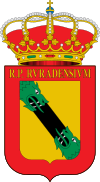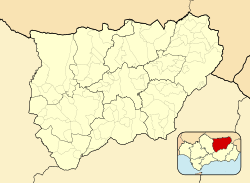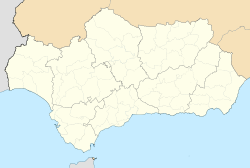Rus, Spain facts for kids
Quick facts for kids
Rus
|
|||
|---|---|---|---|
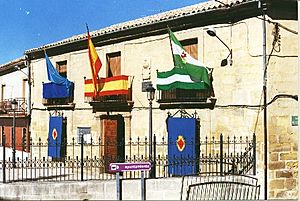
El Ayuntamiento, a historic stone building in Rus.
|
|||
|
|||
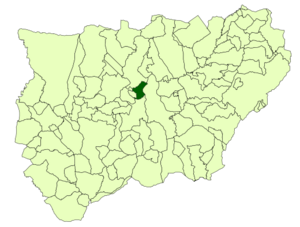 |
|||
| Country | |||
| Autonomous community |
|||
| Province | |||
| Area | |||
| • Total | 47.3 km2 (18.3 sq mi) | ||
| Elevation | 590 m (1,940 ft) | ||
| Population
(2018)
|
|||
| • Total | 3,580 | ||
| • Density | 75.69/km2 (196.0/sq mi) | ||
| Time zone | UTC+1 (CET) | ||
| • Summer (DST) | UTC+2 (CEST) | ||
| Website | www.rus.es | ||
Rus is a charming village and a municipality located in the province of Jaén. This area is part of Andalusia, a large region in southern Spain. It's a place where history and local life come together.
Contents
Discover Rus: A Spanish Village
Rus is a small but interesting place. It has a population of about 3,580 people. This makes it a close-knit community. The village is known for its quiet streets and traditional Spanish feel.
Where is Rus Located?
Rus is found in the heart of the Jaén province. Jaén is famous for its many olive groves. These groves produce a lot of olive oil. Andalusia, the region Rus belongs to, is the southernmost part of mainland Spain. It has a warm climate and a rich cultural history.
What is a Municipality?
A municipality is like a local government area. It includes the main village, Rus, and the land around it. This land might have farms or natural areas. The local government, called the town hall or Ayuntamiento, manages services for the people living there. This includes things like roads and public spaces.
The Ayuntamiento: A Special Building
The Ayuntamiento is the town hall building. In Rus, it's a historic stone building. It's where the local leaders work. They make decisions that help the village run smoothly. This building is often a central point in Spanish villages.
Life in Rus: What's it Like?
Life in Rus is generally peaceful. Many people work in agriculture, especially with olives. The village has schools, shops, and places for people to gather. It's a great place to experience traditional Spanish culture.
Local Traditions and Festivals
Like many Spanish villages, Rus celebrates various festivals throughout the year. These events are often linked to religious holidays or harvest times. They include parades, music, dancing, and special foods. These festivals are a big part of village life. They bring everyone together.
Exploring the Area Around Rus
The area around Rus is beautiful. It has rolling hills and olive trees everywhere. You can find many walking paths and enjoy nature. The climate is warm and sunny for most of the year. This makes it perfect for outdoor activities.
A Glimpse into Rus's History
Rus has a long history, like many places in Spain. Its past is connected to the different groups who have lived in the region over centuries. These include ancient Iberian tribes, Romans, and Moors. Each group left its mark on the culture and architecture.
Ancient Roots
Archaeological finds in the area show that people lived here a very long time ago. These early settlements were often built near water sources. They were also in places that were easy to defend.
Roman and Moorish Influence
During Roman times, the region was important for farming. Later, when the Moors ruled parts of Spain, they brought new farming methods. They also built impressive structures. While specific details for Rus might be scarce, these periods shaped the entire region.
Modern Rus
Over the centuries, Rus grew into the village it is today. It kept its agricultural roots. The village adapted to changes while holding onto its traditions. It continues to be a quiet, charming place.
See also
 In Spanish: Rus (Jaén) para niños
In Spanish: Rus (Jaén) para niños



